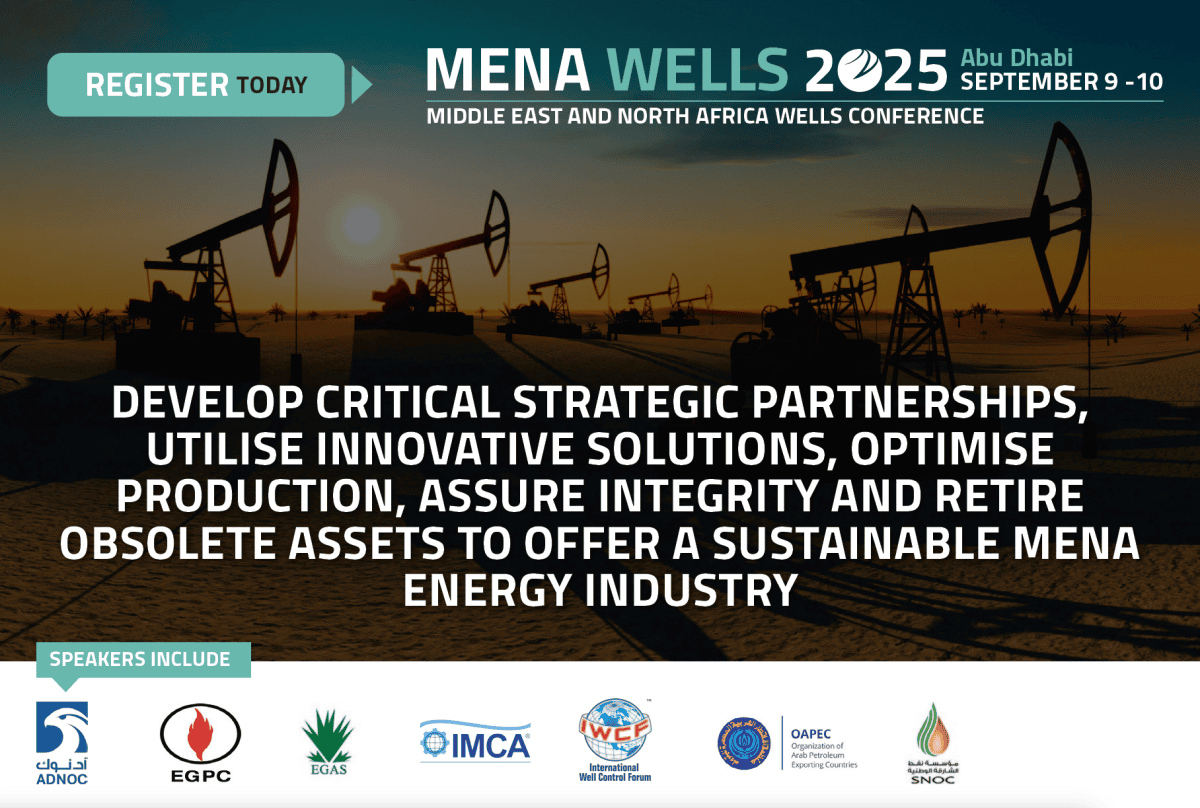
International: Register Now for the MENA Wells 2025 September 9 – September 10, 2025 – Abu Dhabi
Welcome to the New MENA WELLS 2025, previously OWI MENA. Based on your feedback, we’re launching a refreshed experience with MENA WELLS taking place 9–10 September in Abu Dhabi to include the entire well portfolio in the Middle East, from onshore to offshore, and encompass the entire well lifecycle. We also wanted to bring you a brand new refreshed experience with even more value and even more features.
This year’s agenda includes subsea access, well safety, operator workshops, and association events, starting with an exclusive PDO-led session on their well intervention strategy.
Registered delegates also gain access to the IMCA regional meeting on 11 September. Sponsors, exhibitors, and VIPs can take advantage of a dedicated meeting area for high-value networking and deal-making. Expect five networking sessions, 25 expert talks, and 10 tech demos, all crafted to support your work in the region.
We’re excited to welcome you to this next chapter of MENA WELLS, where advancing well safety is a priority, innovative solutions are showcased, and the future of the Middle East & North Africa’s well operations takes shape.
Market Overview & Well Integrity: Strengthening Safety and Reliability in Oil & Gas
Section 1: Market Overview – Pipeline Monitoring and Surveillance for Oil Theft Detection and Prevention
The African oil and gas sector faces mounting challenges when it comes to safety, security, and operational resilience.
As oil theft and pipeline sabotage continue to threaten both production efficiency and environmental safety,
industry leaders are turning toward advanced monitoring and surveillance systems.
- Understanding current safety and security challenges to develop effective mitigation strategies tailored to the African market.
- Identifying emerging threats and opportunities to enhance safety measures and improve operational resilience across upstream and midstream operations.
- Exploring the role of technology in managing oil and gas security, strengthening asset protection, and ensuring regulatory compliance.
By leveraging digital transformation tools such as real-time data monitoring, AI-driven surveillance,
and predictive analytics, operators can significantly reduce risks, safeguard infrastructure,
and protect critical energy assets.
Section 2: Well Integrity – Preventing Premature Well Barrier Failures
Maintaining well integrity is a cornerstone of safe and efficient oil and gas operations.
Failure of well barriers not only leads to costly downtime but also poses significant environmental and safety risks.
Experts emphasize the importance of proactive prevention strategies and continuous improvement initiatives
to strengthen operations.
Key Insights:
- Root Cause Identification: Preventing barrier failures requires enhanced investigation methodologies and robust root-cause analysis.
- Case Study Learnings: Effective analysis highlights the need for advanced resources and methodologies to uncover underlying issues.
- Corrective Actions: Implementing corrective measures helps prevent repeat failures, boosting efficiency and reliability.
- Continuous Improvement: Embedding improvement methodologies into company culture identifies process gaps and ensures long-term resilience.
Expert Contribution
Andrey Yugay, Specialist, Well Integrity (Ops & Control), ADNOC
Free Standing Wells: Revisiting Legacy Assets
- Reassessing 11 wells suspended between 1978–1982, originally plugged with inhibited diesel, to evaluate long-term preservation strategies.
- Examining risks linked to legacy xmas trees left in modified configurations and developing intervention strategies for safer management.
- Reviewing challenges of accessing wellheads below sea level after platform removals, with updates on feasibility studies and future remediation plans.
Muhammad Farooq Zubair, Completion and Workover Engineer, ADNOC
Zonal Isolation Innovation: Expandable Steel Patch Technology
- Minimally invasive steel patches provide solutions for zonal communication issues while reducing downtime and avoiding costly workovers.
- Enhancing well integrity with efficient deployment methods that optimize intervention efficiency.
- Supporting long-term isolation performance through proven technologies that extend well life and safeguard asset value.
Artur Tleulin, Senior Engineer, Drilling (Drilling Completion Materials), ADNOC
Enhancing Well Integrity: Optimising Glass Plug Technology for Barrier Assurance
- Leveraging glass plugs to improve well integrity and address limitations in conventional slickline operations.
- Drawing on lessons learned from over 800 well completions to highlight operational improvements and enhanced equipment reliability.
- Strengthening vendor collaboration to refine deployment strategies in line with drilling plans, HSE, and well integrity standards.
Conclusion
The oil and gas industry continues to face evolving challenges in pipeline monitoring, surveillance, and well integrity.
From preventing theft and sabotage to ensuring long-term well barrier reliability, the sector is embracing advanced technologies,
innovative methodologies, and collaborative partnerships.
By prioritizing continuous improvement and adopting proven solutions such as expandable steel patches and glass plug technology,
operators are not only protecting assets but also driving greater operational resilience for the future.
Panel Session: Enhancing Well Integrity through Innovation
- Predictive Maintenance: Leverage AI and fibre-optic data for early failure detection and improved well reliability to minimise downtime and extend asset life.
- Advanced Materials: Apply corrosion-resistant alloys and composites to extend well life and minimise risks to reduce maintenance costs and improve safety.
- Design Optimisation: Strengthen well architecture with cutting-edge casing and cementing methods to ensure long-term integrity and reduce the need for future interventions.
Fayez Issa, Advisor, Well Integrity, ADNOC
Advanced Well Diagnostics: Field Trial Outcome
- Review the results of diagnosing behind-casing communication (SAP B/C) to better understand annular flow paths and identify persistent diagnostic challenges.
- Assess the performance of conventional logging tools in real-world trials and examine how their limitations impacted pressure anomaly interpretation.
- Share key outcomes from recent field pilots using novel diagnostic solutions, highlighting their effectiveness in revealing well behaviour during pressure build-up and drawdown.
Sergei Vorozhikhin, Senior Engineer Well Integrity (Petrophysics), ADNOC
Ensuring Caprock Integrity of a Depleted Gas Reservoir for Underground Gas Storage Feasibility: A Case Study from Nile Delta
- Address caprock containment uncertainties using integrated geomechanical modelling and reservoir analysis to support safe underground gas storage potential.
- Optimise evaluation of sealing capacity through 3D seismic interpretation, well log correlation, and pressure history to mitigate leakage risks and ensure structural stability.
- Enable long-term storage feasibility by validating caprock integrity with field-proven workflows and cross-disciplinary collaboration to enhance regional energy resilience.
Omar Hamouda, Reservoir Engineer, Egyptian Natural Gas Holding Company
Session 3: Well Productivity
Well Intervention & Well Integrity: Enhancing Asset Performance and Safety
- Optimise well intervention strategies to maximise production to improve cost efficiency.
- Understand the role of well integrity management in extending asset life ensuring operational safety.
- Explore innovations in well intervention technologies to enhance efficiency and mitigate integrity challenges.
Wessam Hamdy Abdelateef Elgrawany, Well Intervention & Well Integrity Engineer, North Bahariya Petroleum Company
Enhancing Productivity of Gas Storage Wells Using Underbalanced Coiled Tubing Drilling (UBCTD) – A Success Story in Sharjah
- Understand the fundamentals of UBCTD and gain insights into the project background, highlighting its relevance to gas storage optimisation in Sharjah.
- Explore the detailed planning and execution phases of the project to showcase best practices in technical preparation, team coordination, and operational delivery.
- Examine the key challenges faced during implementation and assess the outcomes achieved, focusing on productivity gains, lessons learned, and future potential for UBCTD applications.
Harshil Saradva, Senior Reservoir Engineer, Sharjah National Oil Corporation
Subsea Decommissioning and Diving Safety: Lessons from High-Potential Incidents
- Explore key aspects of subsea decommissioning with a focus on diving operations, using three real-world projects as case studies.
- Examine high-potential incidents from each project where divers were injured, highlighting how close these events came to being fatal.
- Identify what went wrong, uncover root causes, and share critical lessons the industry must adopt to improve diver safety and prevent similar incidents in future operations.
Bill Chilton, Diving Manager, International Marine Contractors Association



